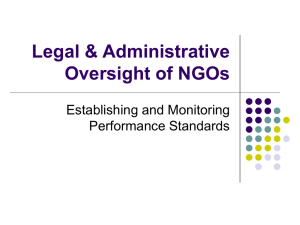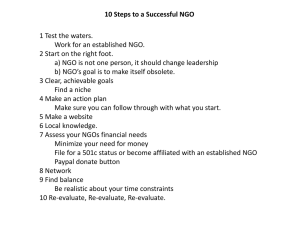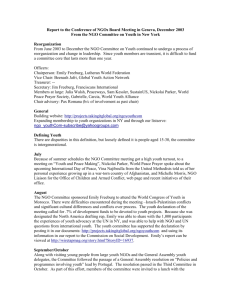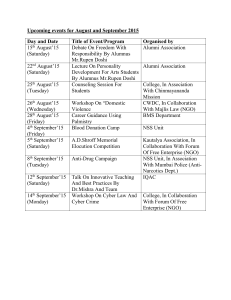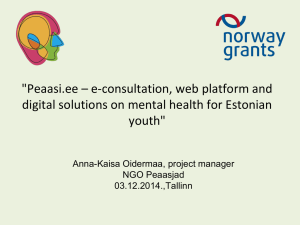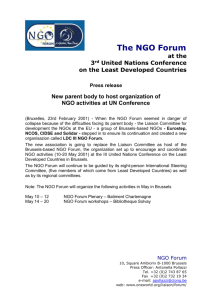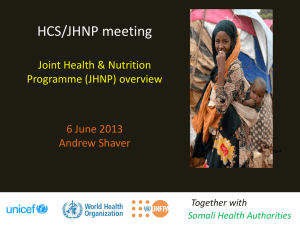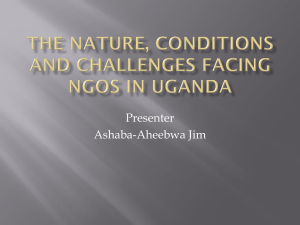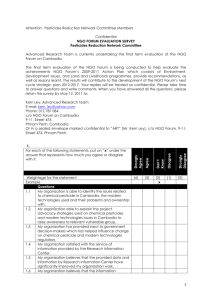- National Health Mission
advertisement
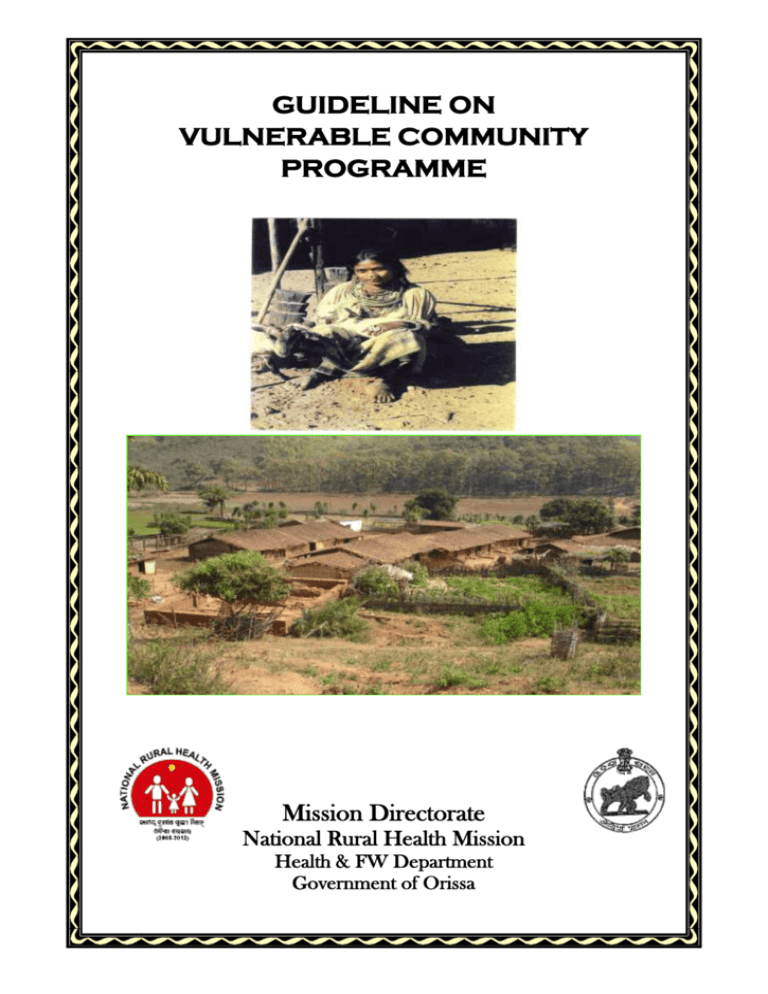
GUIDELINE ON VULNERABLE COMMUNITY PROGRAMME Mission Directorate National Rural Health Mission Health & FW Department Government of Orissa 1. Background Vulnerable communities residing in remote & inaccessible pockets are underserved due to problems of geographical access and those who suffer social and economic disadvantages such as Primitive Tribes, Scheduled Castes/Scheduled Tribes (SCs/STs) etc. The RCH indicators of vulnerable population are very low than the District/ State average. Marginalization results in poorer social indicators for these groups, including maternal and child health indicators. This can be as much a result of service provider behaviour as of health seeking behaviour and capabilities. NRHM, has taken initiatives to address the health/RCH issues of those area with focus attention on strengthen capacity, effectiveness and participation of civil society, with specific recommendations of District health authority and other stakeholders. This concept of RCH is to provide to the beneficiaries need based, client centered, demand driven, high quality and integrated RCH services. The overall strategy of NRHM, Govt. of Orissa is to strive for obtaining RCH arrangements for the whole population and to promote and make available contraceptive/ terminal methods for desirous couples. This integrated approach will help in reducing the cost of inputs as the overlapping of expenditures will no longer be necessary and the integrated implementation will optimize the outcome at field levels. This programme incorporates inputs from Govt. of Orissa as well as funding from external donor agencies. Since the implementation of the planned measures under NRHM, it is one of the mandates to improve the health and wellbeing on the vulnerable masses residing in hard to reach areas or in cut off zones. With high incidences of maternal and child mortality rate and ratio than of the district and state average, it seems to be a great challenge to improve the health indicators and to address the health needs at par with the rest of the state. 2. Targeted Community Communities living in unserved/underserved areas having poor RCH indicators (fisherman community, migration population, ST/SC community etc) Primitive Tribal Group (Juang community, Kui, Kutiakandha, Bonda, Pouda bhuyan etc) 3. Salient Features of the VG programme Area Specific need based RCH interventions to improve the health indicators. An annual grant of Rs 3 lakhs is allotted for area specific interventions. Participatory local level specific micro plan developed by the target stakeholders. Participation beyond NGO – The projects meant for primitive tribal groups (PTGs) and other deprived communities such as fisherman community, migration population, ST/SC community etc. The project are being carried out 2 by Government run administrative agencies like the Bonda Development Agency, Kutia Kandha Development Agency, Juang Development Society and NGOs. Coverage population is around five to ten thousands in particular patches of vulnerable community. 4. Conditionality No duplication of ongoing activities. It takes immediate gap filling areas through special innovation. Public hearing meeting to provide feedback to the system for strengthening of service delivery. Further strengthening of ongoing activities with supplementation of ideas from different key stakeholders. Creation of models for replication. Withdrawal strategy after substantial strengthening of existing public health delivery system. 5. Components under the programme The focus is given on following key technical components and community mobilization initiatives like; Maternal Health -ANC, PNC, Promotion of institutional delivery, referral transportation during the emergency, VHND, outreach camps, RTI/STI screening etc. Child Health – Immunization, Pustikar Diwas, facilitate in School health programme. Family Planning – promotion of temporary and permanent FP methods, counseling etc. Adolescent & Sexual Reproductive Health - formation of Balika Mandal, sensitization of life skill education, personal hygiene, deworming, IFA etc. Communalization process - strengthening of ASHA & GKS activities, facilitate in preparation of GKS health plan, development of kitchen garden, reward & reorganization etc. IEC/BCC – observation of different designation days at community level, mass IEC campaign, wall paining. 6. Activities The activities prepared followed by a consultation meeting with key stakeholders at local level represented by PRI members, ASHA, HW(F),Volunteer Organizations, Block Health Officials, District Health Official to ensure situation & need based activities. 3 7. Role of NGO in implementation of the programme The NGO identified to provide services will facilitate the following activities: Act on behalf of NRHM, Orissa in effective planning and delivery of services in the identified area. Provide preventive and promotive services at the community level. Facilitate in implementation of National Health Programmes in the service area. Strengthen referral services for sick children, pregnant women and cases with other complications. Promote comprehensive client centered integrated Public Health Communication strategy to bring about a change in knowledge, attitude, behavior practices in the population through Community Health Partnership Programme. Encouraging Institutional/Outreach services for pregnant women, family planning sterilization, adolescent health etc. Hand holding support to Health Workers, ASHA, AWWs etc on various preventive aspects of health care. Facilitate in strengthening of GKS activities. Documentation of best practices and replication. Physical & financial report submission. 8. Manpower under the programme ,,, One Project Coordinator Two Community Health Workers 9. Monitoring & Evaluation The NGO will internally review the programme in every month with the project staff. At district level the programme will be review in every month in a fixed day PPP review meeting by the CDMO / ADMO (FW) / DPM i.e, 12th of every month. At State level, the programme will be review in quarterly. The partner NGO have to submit monthly progress report in a prescribed format to CDMO/CMMO and NRHM, Orissa regularly and a copy must be submitted to the concerned MO I/c. The mid-term and final evaluation of the programme will be conducted by external agencies after completion of one year and before completion of three year of project. 4 10.Reports and records to be maintained a) Village and area maps b) Household survey Register. c) Eligible couple register (ECR) d) MCH Register and Immunization Card – Maternal Care e) f) g) Institutional delivery Referral register Register for Recording Contraceptives. I. II. Condom Distribution Oral Pill Register III. IUD Register IV. Sterilization Register – Male/ Female h) Birth / Death Register. i) Register for recording meetings held for consultative process. j) Stock Register. k) Community level meeting. l) File for duplicate copy of the monthly report submitted for each month. m) Daily Diary. n) IEC/BCC. o) National Health Program Register. p) Administrative Records. q) r) s) Financial Records. Success story record Any other 11. Budget provision There is provision of Rs. 3 lakhs per annum for implementation of the programme. The situation based activities for the programme should be prepared & finalized after a consultative process as per the given components under the porgramme. The final activities and action plan must be approved by the CDMO of respective district. At any situation the budget should not be more than the fixed budget. 5 12. Funds release provision After receipt of the signed copy of MoU & bank guarantee from the NGO, the CDMO/DPM shall make the necessary arrangements to release the grant-in-aid to NGO in instalments (6 months basis) likewise; 1. The 1st installment will be released within 7 days of submission of MoU and bank guarantee by NGO. 2. The 2nd installment will be released after receipt of the utilization of 75% of 1st instalment. The 3rd installment will be released after receipt of the annual audit report and annual progress report from the NGO. 1st year Project 3. 2nd year Project 4. 5. 3rd year Project 6. The 4th installment will be released to the NGO after receipt of the satisfactory mid-term evaluation report. 5th installment will be released to the NGO after receipt of the satisfactory mid-term evaluation report. The final (6th) installment will be released after receipt of the satisfactory final evaluation report from the external evaluating agency. 6 PARTNER NGO SELECTION PROCEDURE Selection of area for project: A mapping shall be done by the district team consist of CDMO, ADMO (FW), MEIO, DPM, DHIO and other officials for selection of vulnerable groups like communities living in unserved/underserved areas having poor RCH indicators (fisherman community, migration population, ST/SC community etc), Primitive Tribal Group (Juang community, Kui, Kutiakandha, Bonda, Pouda bhuyan, any other). Steps of NGO selection: Step 1 Step 2 Step 3 Step 4 Step 5 Seep 6 Advertisement inviting proposals from NGOs at district level. Desk Appraisal of NGO applications by DPM, DAM, DHIO, MEIO Field appraisals of shortlisted NGOs by District Appraisal Team consist of CDMO or his/her Doctor Representative, MEIO/Dy. MEIO, DPM & DAM. District NGO committee meeting under the Chairpersonship of Collector and recommendation of proposal to NRHM, Orissa. Approval of State NGO Committee on the proposal of Dist. NGO Committee Signing of MOU with selected NGO by ZSS. Criteria for NGO selection: NGOs applying for providing services to vulnerable groups must fulfil the following eligibility criteria. The criteria have been grouped into four sections. These are criteria for Registration, Experience, Assets and Jurisdiction. A. Registration: NGO should be registered under the Society Registration Act for more than 3 years. Registration for at least three years under appropriate act with 12-A IT registration. B. District Presence: NGO should have office in the same Block/District for which it is seeking funding. C. Experience: Proven experience of working for three years in Health & Family Welfare or any Social Development Sector. Preference may be given to NGOs having experience in RCH or any Health related programmes. D. Assets: Infrastructure, land & building in value of Rs. 1 lakh in the name of the NGO. Have sound financial outlay as per the last Balance sheet & willingness to provide Bank guarantee against the sanctioned amount (2 to 5%). E. The NGO should not be black listed by Govt./RMK/CAPART and there should not be funding restriction/stop to the NGO by any Department/Ministry of State Govt/GoI. Application procedure: The interested NGOs may submit their applications with necessary documents to the Chief District Medical Officer of concerned district through speed post/registered post. 7 ACTIVITIES AND BUDGET FOR VULNERABLE COMMUNITY PROGRAMME (Covering around 5000 to 10000 population) Sl. No 01 1.1 1.2 1.3 1.4 1.5 1.6 1.7 1.8 02 2.1 2.2 2.3 03 3.1 3.2 3.3 04 4.1 4.2 4.3 05 5.1 Program Activity Maternal & Child Health ANC/ PNC Camp for drop out cases @ Rs. 500/- per camps x 12 camps/ year Strengthening VHND programs @ Rs. 200/- x 45 camps/ year Special catch up immunization program for drop out and left out cases in each month @ Rs. 500/- x 12 camps Health Camp (including RCH and general health complication check up and treatment @ Rs. 5,000/- x 04 nos. Referral for Sick neonates & critical pregnant mothers @Rs.150/-case (40 cases) Preparation of birth preparedness calendar for pregnant women at least 100 cases @ Rs 15/per calendar x 100 cases RCH education session in SHG meetings @ Rs. 200/- per session x 30 session/ year Procurement of Medicines for PW, LM,RTI /STI and during complication of FP cases including other general diseases @ Rs. 1000/- per month x 12 months Sub Total Adolescent Health Formation of Balika Mandal (10 nos.) & Training for 150 nos of adolescent girls in 5 batches to ensure IFA, TT, Deworming and Balika Mandal activities @ Rs 1500 x 5 batches One day follow up meeting of Balika mandal @ Rs. 200/- x 10 programme Counseling and health check up camps for adolescent @ Rs. 1000/- per camp x 10 camps (10 boys & 10 girls) year Sub Total RTI/STI RTI/ STI screening camp 4 times in year @ Rs. 1000/- per camp x 4 camps Ensuring 100 nos of full phase treatment of RTI cases (provision for medicine) @ Rs. 100/- x 100 nos of cases One day workshop on prevention of RTI/ STI & HIV Aids for eligible couple, adolescent and general public for 15 villages 2 times in a year @ Rs. 2500/- per workshop x 2 workshops Sub Total FAMILY PLANNING Expenses for transportation of female & male sterilization cases to camps @ Rs. 150 X 40 participants Formation & sensitization of CBD Centres(06 groups)-02 trainings Social Marketing of Contraceptives,ORS,Sanitary napkin through CBD centres for 06 groups @500/- group Sub Total Community Participation Mass IEC campaign for community participation including Health quiz for all and award distribution system will be ensured during observation of designated days @ Rs. 2000/- x 4 nos programme. Allocated Budget 6000.00 9000.00 6000.00 20000.00 6000.00 1500.00 6000.00 12000.00 66,500.00 7500.00 2000.00 10000.00 19,500.00 4000.00 10000.00 5000.00 19,000.00 6000.00 3000.00 3000.00 12,000.00 8000.00 8 5.2 5.3 5.4 5.5 5.6 5.7 5.8 5.9 5.10 06 6.1 6.2 6.3 6.4 6.5 6.6 6.7 Wall painting-10 nos @ Rs. 500/- per walling Suggestion box to receive Health issues among the community people for each village Rs 100 x 20 box Promotion of kitchen garden (plant of drumstick, banana and papaya ) among 100 nos of pregnant women(BPL) @ 40 x 50 PW cases Name plate for AWW/ANM/PRIs in each village @ Rs 150 x 20 cases Quarterly meeting with GKS members for preparation of Health Plan & utilization of Untied fund & Health Advocacy @ Rs 250 x 20 meetings Reproductive rights and gender sensitization workshop @ Rs. 2000/- per workshop x 1 workshop/ year Observation of Safe motherhood day on 11th April @ Rs. 3000/- x 1 Awareness on HIV/ AIDS and other health issues among the PRI members (30participants X Rs. 50/- ) twice in a year. Award ceremony for best GKS, Balika Mandal, ASHA, AWW and transporters once in a year Sub Total Administrative Expenses Travel and DOL @ Rs. 1500/- x 12 months for staff Monitoring @ Rs. 500/- x 12 months Data entry and process documentation @ Rs. 500/- x 12 months Printing forms, materials and registers including other documents , stationery @ Rs. 500/- x 12 months Allowances to Project Coordinator @ Rs. 4000/- per months x 12 months Allowances to Community Health Workers/Community Mobiliser @ Rs. 2000/- per month x 12 months x 2 CHW Institutional Overhead including telephone & audit expenses Sub Total Total 5000.00 2000.00 2000.00 3000.00 5000.00 3000.00 2000.00 3000.00 5000.00 38,000.00 18000.00 6000.00 6000.00 6000.00 48000.00 48000.00 13,000 1,45,000.00 3,00,000 9
